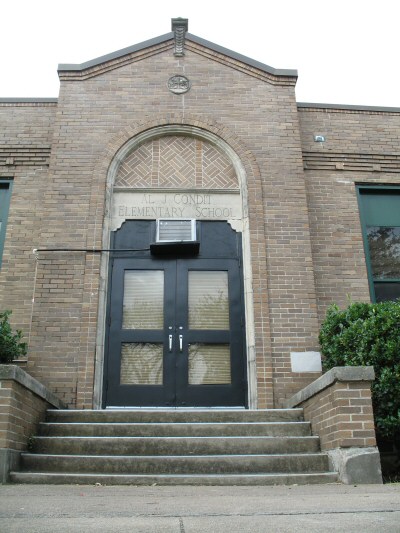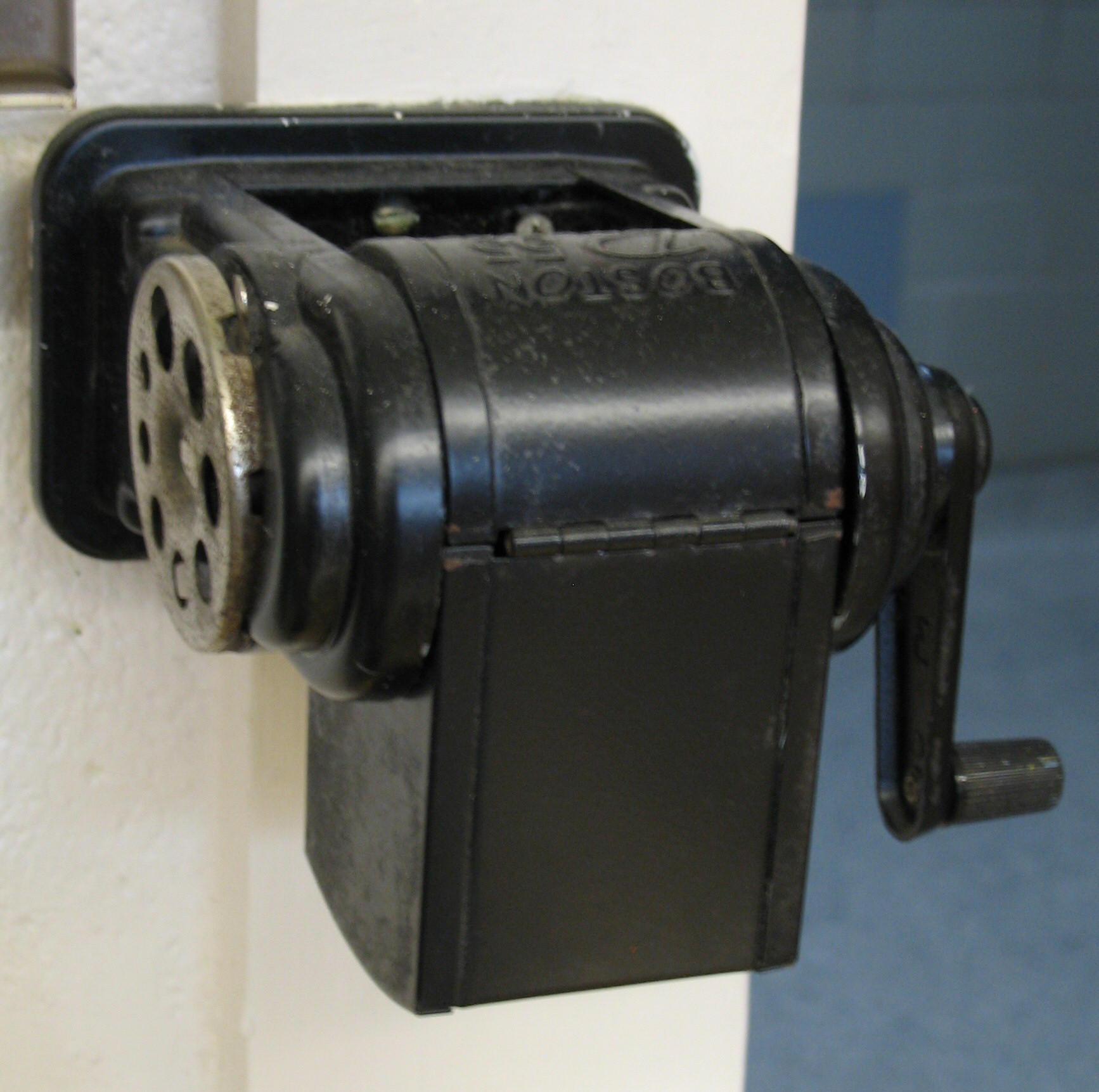December 28, 2008

By an extraordinary coincidence, I just recently met the current principal of my elementary school. Calling him by first name gave me a textbook case of cognitive dissonance.
In my mind, the staff at Condit Elementary will always be female, twice my height, shellacked with hair spray, and dressed for the '70s (in some cases, the '60s and '50s, in keeping with Bellaire's fashion speed). They resembled our mothers enough to prevent our ever challenging them; I don't recall any outright defiance in the classroom, ever.
Enough of them smoked to make the teachers' lounge a room you could locate blindfolded. Only one teacher was young enough for me to have a crush on, and she was an assistant. They all drove sedans.
Our principal, a tense, wrinkled woman with beehive hair and a pointed face, paid visits to our classrooms over any minor crisis. She lectured us holding her arms straight at her sides, rolling her fingers as if she'd just noticed cobwebs on them. To me, this looked like a threat to use her nails on us. However, to my knowledge she never actually laid a hand on any child; being made to wait outside her office for an hour was the worst kind of punishment.
That's not to say we had no fun. The recess game of choice was kickball, played with a big, red, pneumatic ball that drop-kicked with a bang. The challenge was getting it over the fielders' heads but short of the six-foot chain-link fence; that was an out, and the teacher had to closely monitor whoever she chose to retrieve it. You didn't want to send the most eager kid, as he was also the most likely to run headlong into a passing car.
Once that ritual had worn out our teachers' nerves, they switched us to hitting a volleyball with our fist. No way could we put it over a fence, mainly because it was pumped up hard enough to make our knuckles bleed.
On late spring and early autumn days it must've been 90 degrees out there on the asphalt. Somehow we didn't seem to mind. Teachers must have hated recess.
I remember all my teachers' names. I would feel strange including them here because by now, many of them are dead.
There's something to ponder: For all the sing-songs we made up about "killing" our teachers, we never stopped to think how we'd feel once they were actually gone.
the kitchen was staffed by two black women in hair nets. If they had help feeding 400 kids, I never saw it. One called us "honey" in the Southern way that meant something like the opposite: "Honey, don't you bang yo' tray like that," and when you saw her inch-long fingernails curled over the edge of your cobbler bowl you knew she had leverage you didn't want to think about.
The two of them baked vast sheets of tall, brown-topped yeast rolls that melted in your mouth; the golden edges came from butter ladled on as they emerged from the oven. You could smell them a block away. One time somebody's mom persuaded them to share the recipe with all of us, and none of our mothers ever got it right.
A hot plate-lunch cost $.40 in 1970, inflating to $.95 by '76. Breaded beef cutlet was my favorite, because I could sop up the gravy and mashed potatoes with the yeast roll. We could get an extra bun for $.05, and cutlet day was the one to splurge on. The half-pint carton of whole milk was never enough; the bigger boys always bought a second.
We dined eight to a table in the "cafetorium," which always smelled of hot butter, polyurethane, and disinfectant. Each day the custodian broke down all 20 tables to clean the floor. One afternoon, all the fourth-grade boys were sent to help him. That was when the fourth-grade girls, rounded up into one classroom, saw a special movie, which none of them would talk about later. At least not with the boys.
one day our third-grade teacher took an empty desk in the front of the classroom, turned it around, and sat down, signaling the start of a monologue that would, in short order, have us leering at the clock and doodling.
She talked vaguely and at length about two new students who would be joining us that week. We had no idea why this was a big deal; previously, new kids just showed up looking terrified and took a seat in the back until they figured out how to fit in.
Before the next morning's opening bell, as dozens of white kids and a smattering of Hispanics played pick-up games all over the schoolyard, a taxicab rolled up to the front gate. Two black children got out and were escorted to the office by our assistant principal. Later, after we'd all settled into our classrooms, she led them to their respective third-grade teachers, who introduced them to us as Ruby and Delano Johnson, brother and sister.
This was no Little Rock Central High moment. Nor was it Brown v. Board of Education, because neither of the children lived near Condit. They hadn't been denied access to our school for their race; in fact, they had been enrolled precisely because of it.
And with that single act, the 400-pupil Condit Elementary was desegregated.
I have no idea how that measure got approved, but I imagine that in its wake, there was no small amount of look-busy whistling around H.I.S.D. headquarters until some federal judge turned his attention elsewhere.
 amid these warm and quirky memories of elementary school, I have none for what I received in the way of actual education. By the time I entered kindergarten, I knew how to read. My classmates broke into applause after I buzzed through a whole page in our reading-book, stumble-free. So, the first grade—of which many hours were spent in a "reading circle"—taught me mostly how to daydream with gusto.
amid these warm and quirky memories of elementary school, I have none for what I received in the way of actual education. By the time I entered kindergarten, I knew how to read. My classmates broke into applause after I buzzed through a whole page in our reading-book, stumble-free. So, the first grade—of which many hours were spent in a "reading circle"—taught me mostly how to daydream with gusto.
My first-grade teacher at least noticed that I was ahead of the game. One day she escorted me around to the other classrooms to boast that I had spelled "Rumpelstiltskin" correctly after hearing it once. Later, the same teacher traipsed me down the hall to show the results of my Iowa Test of Basic Skills to the other teachers; I scored in the 99th percentile across-the-board.
But there was no talk of advancing me to a higher grade. I would be allowed to progress through school no faster than the slowest student my age.
at some point the boredom drove me to feign illness just to get out of class. "Miss Scott, my stomach hurts," I'd say, so often and so predictably that she'd have the hall pass ready when I reached her desk. The school nurse always asked if I'd been to the bathroom, and I always answered yes, and several times the ploy enabled me to go home. Eventually my family doctor pronounced me healthy; the mystery ailment—tedium—was never identified.
My second-grade teacher took less interest in me. She would retire at the close of that year—meaning she'd been in the classroom since D-Day—and she pretty much phoned it in. We endured a daily chore called "seatwork," which involved filling blanks on mimeographed pages while the teacher read a novel. Missing letters, numbers, words, that sort of pedantic stuff—all well below my level and so boring I couldn't stand it. No sooner had the smudgy blue sheets hit my desk than I checked out, Calvin-and-Hobbes style, off to an adventure in my head. At some point the teacher called my mother in to discuss my flagging participation. Neither of them seemed to have any insight, and I couldn't explain myself. I simply didn't want to do such dreadfully repetitive work.
In the third grade, I had the blessing of a teacher who recognized my aptitude. She flattered me in a note to my parents, calling attention to my "God-given talents." Still, I don't recall her doing much on my behalf; grade advancement was still off the table, and I never heard of anyone else getting bumped ahead.
By this time, the aptitude tests classified me a full two years above grade.
by fourth grade i had begun to view teachers as adversaries. Few of them seemed very bright—I corrected their English so often they threatened to dismiss me—and many appeared to be marking time rather than taking interest in their charges. I started acting out in unconventional ways—signing my papers with cartoon-character names, for example—because in those days, conventional disobedience brought corporal punishment.
 In my last couple of years at Condit, I studied nothing, and that habit served me poorly the rest of my academic years. I never learned how to learn things unless they sparked some interest within me. My fantasy world shielded me from the grinding boredom of textbooks, chalkboards, and repetitive exercises.
In my last couple of years at Condit, I studied nothing, and that habit served me poorly the rest of my academic years. I never learned how to learn things unless they sparked some interest within me. My fantasy world shielded me from the grinding boredom of textbooks, chalkboards, and repetitive exercises.
In the final weeks of sixth grade, I remember the excitement when a representative from the junior high came to offer us course sign-up sheets. I elected violin and French, eager for something—anything—to show that I could rise to a challenge if only one were available. These foreign disciplines would be my way of breaking free, soaring high over the pack, unleashing my potential.
Both courses filled up before I got there.
See also Bellaire: Biggest City in Houston.
Notes:
What our adminstrators feared most was losing control of us students. This seemed especially acute among the less-competent ones. (I count teachers as adminstrators because they administer a classroom.)
The best example was my fifth-grade teacher. Sarcastic and temperamental, she avoided interaction with us by reading paperbacks at her desk while we worked. But what certainly drew her attention was any one of us who got out of line.
Her most virulent and extended tirade took place one afternoon when she was in the class at 2:45, when she usually took a smoke break. We'd always have a pile of busy-work to finish by dismissal at 3:15, and at 2:45 every day someone in the principal's office made a campus-wide announcement, "The 2:45 bus is here. The 2:45 bus." At this, I'd gotten into the habit of jumping out of my daydreams and into high gear, so as to finish my busy-work on time. I'd also adopted an exclamation from a comic strip, "Hotcha-a-a!" in response.
My classmates came to think this was funny, in the spirit of Fonzie's "Heyy," or Fred Flintstone's "Yabba dabba doo!" a mindless expression made funny simply by repetition and branding. Some learned to blurt it out along with me.
On this particular day, our teacher had skipped her afternoon cigarette—perhaps her novel had taken an absorbing turn—and when the "2:45 bus is here" announcement ended, the whole class erupted in a chorus of "Hotcha-a-a!
Jolted, she looked at us as if we'd suddenly morphed into gargoyles. I don't remember anything she said, but it came out in a stream of near-obscenities and threats, none of which made sense because you couldn't punish an entire classroom for … what, saying the same word simultaneously?
I was reminded of this decades later, when China's Falun Gong freaked out the government by flash-mobbing a perimeter around the legislature and just staring silently at the building. A violent persecution followed.
The insecure cannot tolerate organization among their charges. It's too threatening, even when it's not.
Posted by: Michael Rittenhouse at
02:30 PM
| Comments (5)
| Add Comment
Post contains 1953 words, total size 13 kb.
Posted by: RebeccaH at January 11, 2009 11:10 AM (JAQT9)
Nice trip down memory lane, though; there certainly were a lot of parallels (our cafetorium was a "cafegymnatorium" for a while). But your school didn't desegregate till the '70s? Wow...
Posted by: Kev at August 14, 2009 03:29 PM (/l8+v)
Great remembrance of Condit---I too was a child of this time warped, "McCarthyesque" elementary school in the 70's. I think often of our school nurse and her preoccupation with bowel habits as the source of all ailments. I think too of Mrs. N, and her lack of indiscretion with discipline during daily lunches; and I think I still have issues resultng from the all too public humiliation. I also remember Bellaire threatening to form its own Independent School District in protest of the forced segregration. HISD's answer to the protests: Can you say Magnet Schools? Bellaire High became a magnet for eccentric foreign languages...can you say college-bound only please?
Posted by: cc at February 11, 2010 07:23 PM (tpGUs)

I was one of Miss Tuckers "Blue Birds"(or was it red?), which was the highest level reading group, while the "Yellow Birds",...well, they were getting things done, just not as quickly. I remember carrying those colors around in my mind for some time afterward as being either good or bad. I guess that's why they don't do that anymore.
Given your age, you must have preceded me by a couple of years and it got me to thinking of whether I remembered any black friends, and I didn't. I guess there just weren't many black kids there. My first race war didn't come until 3rd grade at Cunningham wherein a boy called me a "N___ lover" due to one of my friends being black as we waited for our parents to pick us up after school. I was small in size and painfully shy and quiet, but I kicked him in the shin, and he in turn kicked my Osmond Brothers lunch box across the sidewalk, scuffing Donny.
No felony assault charges were brought by the DA back then, and he left me alone after that. Still one of my prouder moments.

Posted by: Chantal at July 20, 2011 07:12 AM (IZlNF)
I attended Condit from 3rd grade on. (76-79) I don't remember feeling bored. We held mock elections, and were taught early on about poetry and encouraged to be creative. I had some artistic ability and my teachers liked to hang my portraits of A.J. Condit and the cabin he lived in out in the hall for all the classes to see. We also had violin classes and an orchestra class available to us after school on campus. My early teachers were very strict, and no one dared step out of line. Unless you wanted to find yourself standing in the corner with your hands held up in the air for what seamed like hours, but was really only 5 minutes. By far my best year was sixth grade, with the best teacher there ever was. Ms. Danvers was young and enthusiastic. She had graduated from Bellaire High School with my older brother and my sister-in-law. She brought her guitar to class and taught us all of the great folk songs. She instilled a love of reading in all of her students, by sharing her favorite books with us. Each day she read from "A Wrinkle In Time" and the other books in the series, as well as short stories by Ray Bradbury. We couldn't wait each day to find out what Meg and her little brother Charles Wallace were up to next. She was also very creative and ecouraged us to use our imaginations. Our art projects were more than the normal water color paint and crayons. We all helped with creating artwork for the boards in the hallways all year round. None of that pre-packaged cutout decorations used by the other teachers. I lived just a few blocks from the school and walked home each day with my friends. We rode our bikes everywhere in Bellaire. I really miss that. I wish there was an area like that for my son to grow up in, but I don't think they exist anymore.
Sorry I don't carry the same feelings of boredom you had during your years at Condit, but I do know what you mean about the kickball games on the hot asphalt. Remember chasing the white fluffs of seed pods from the huge cottonwood tree across the street from the playground? We would catch them and then blow them out of out hands. Hopscotch was also a big favorite at recess.
As for the obvious subject of the article, we had more than 2 black children in the school by then, but we all got along. I don't however remember any of them living nearby the school. We also had Lebanese and Hispanic children, who did live in the area as well as several children whose families had worked overseas and previously lived in Iran and Saudia Arabia. I think by 79 the area and school was becoming more diverse.
Thanks for jogging my memory. 
Posted by: katy Hodgetts at August 07, 2011 12:22 PM (Qbe4G)
23 queries taking 0.0117 seconds, 22 records returned.
Powered by Minx 1.1.6c-pink.
